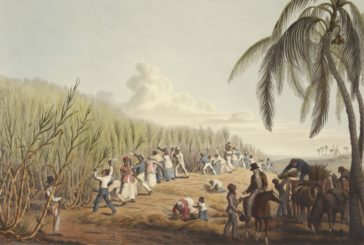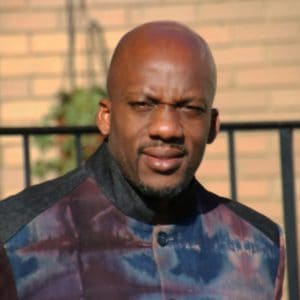
“I can’t breathe,” he pleaded. For several minutes, George Floyd lay handcuffed and pinned to the ground by a white Minneapolis police officer kneeling on his neck.
“Please,” he begged. The officer wouldn’t relent. By the time an ambulance arrived at the scene, Floyd was unresponsive.
As much of the nation erupts in outrage about these latest episodes of anti-Black violence, many are asking, “What do I do?” They want to know how to make the killings stop.
But the truth is that murders like Floyd’s will never truly become a relic of the past until the U.S. finally abolishes slavery.
One of the greatest myths about slavery in America is that it ended.
One of the greatest myths about slavery in America is that it ended. I’m aware that one-hundred-fifty-five years ago, President Abraham Lincoln declared enslaved people living in states in “actual armed rebellion against the authority and government of the United States” to be free.
However, the Constitutional amendment we’re taught “abolished” slavery (number 13) actually set the stage for it to continue. Far from categorically prohibiting the practice, it changed the provisions so that it could be justifiable under certain conditions: namely, as punishment for crime.
This legislative sleight of hand seems to betray that America may have never intended for slavery to truly end. After all, a person who’s serious about kicking alcohol addiction doesn’t keep a bottle of rum under the sink.
The 13th amendment is a telling innovation in the opposite direction of abolition. Not only does it preserve slavery, it foreshadows in black and white the trajectory of criminal justice in this country. It announces that, henceforth, those who are labeled criminals can be treated as the enslaved were, and those who handle these criminals can act with the same cruelty as those who once punished the enslaved.
It betrays that America’s justice institutions will be animated by the same spirit behind that of the plantation. And history bears witness to this.
What would America even be without organized Black suffering? Without our blood, what ink will America have to write its story?
We know that plantations evolved into prisons. And the cruelty of the plantation, where the enslaved were treated as non-humans, continues in state penitentiaries, where criminals are treated as though their human rights have been forfeited. The horrors that once characterized plantation life are present in the life of the prison: like the enslaved, the incarcerated are often vulnerable to forced labor, sexual assault, and torture.
We know that the slave patrols, meant to capture and return runaway slaves to their captors, evolved into police departments. And like fugitive slaves, those who find themselves in the hands of police are likely to be brutalized.
To argue that the Emancipation Proclamation ended all forms of systematic anti-Black oppression and violence once and for all is like saying recorded music disappeared from the world once people stopped using the Gramophone.
Just as the technologies for listening to music have evolved from vinyl records to cassette tapes, to compact discs to iPods, to iPhones (and back to vinyl), the American technologies of anti-Black oppression—and the stories we tell to justify them—have also evolved.
Therefore, we have no reason to act surprised when the institutions that stand directly in the legacy of enslavement continue to act in the same patterns of violence.
To chant justice for George Floyd, or Breonna Taylor, or Ahmaud Arbery without also seriously considering fundamental police reform is tantamount to having our cake and eating it. One must choose. We can either end racism or keep our racist institutions but we can’t have both.
To end slavery, we must abolish the plantation and fire the slave catchers—decisively, categorically, and forever.
The question of what will take the place of policing and prisons is salient, but not for the reasons many think. It’s an important question because of the way it obscures this country’s addiction to anti-Black violence. The truth is that prisons torture and police terrorize, and in doing so they contribute to the problems we claim they solve, and their victims are disproportionately Black.
So then, the question beneath what would we do without them is really: “What would America even be without organized Black suffering?” Without our blood, what ink will America have to write its story?
To pretend these questions are unanswerable is to concede that this society is indeed, as Martin Luther King, Jr. once said, “the greatest purveyor of violence in the world.” It is to confess that racism is as American as baseball or apple pie.
But it doesn’t have to be this way. To be resigned to an anti-Black existence as a nation is a refusal to dream. And until America begins to dream seriously about a society where its alleged greatness is not the offspring of violence, and “safety” is not the product of terror, there will be more George Floyds.
 Andre Henry is the program manager for the Racial Justice Institute at Christians for Social Action. He holds a B.A. in Practical Theology and an M.A. in Theology with an emphasis in Biblical Languages. He’s passionate about music, faith, racial justice, and social change. Follow him on Twitter @andrehenry or learn more about him on his website. This article first appeared on Medium.
Andre Henry is the program manager for the Racial Justice Institute at Christians for Social Action. He holds a B.A. in Practical Theology and an M.A. in Theology with an emphasis in Biblical Languages. He’s passionate about music, faith, racial justice, and social change. Follow him on Twitter @andrehenry or learn more about him on his website. This article first appeared on Medium.


